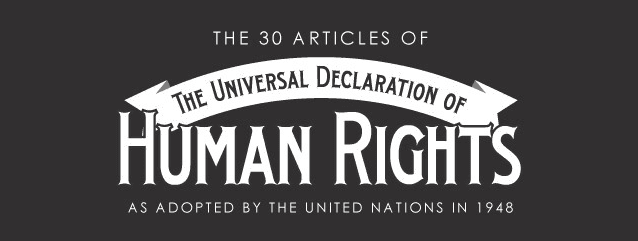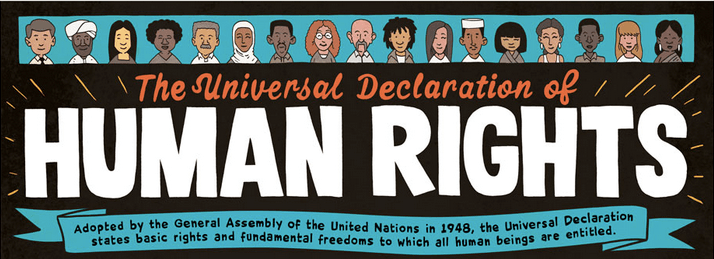Our Vision
Our vision includes a Declaration of Human Rights that applies to all citizens of the United States, without exception or distinction of any kind. The rights we present here were originally a project of Eleanor Roosevelt in conjunction with the United Nations in 1948. We have adapted them for use in these times, but the essence remains the same.

Preamble
All people are entitled to the rights and freedoms described in this declaration without distinction of any kind. This includes, but is not limited to race, sex, language. religious denomination or status, sexual orientation, gender identity, political opinions, economic status, national or social origin, property status, birth or other status. Furthermore, no distinction or exception shall be made on the basis of political, jurisdictional or international status of the country or territory from which a person originates.
These rights apply to every citizen of the United States. Furthermore, they shall not to be restricted or overturned by any referenda or legislation proposed by any individual or group of individuals. Legislation shall be used only to expand civil and human rights, not restrict them. In the exercise of one's rights and freedoms, limitations apply solely for the purpose of ensuring respect for the rights and freedoms of others, and to ensure the health and safety of the public. No individual's rights are more important than another's.
Article 1
All people are born free and equal in dignity and rights. They are endowed with reason and conscience and should act toward one another in the spirit of brotherhood.
Article 2
Everyone has the right to life, liberty, and security of person without exception or distinction.
Article 3
No one shall be held in slavery or servitude regardless of status. Slavery and the slave trade shall be prohibited in all forms.
Article 4
No one shall be subjected to physical or psychological torture, or to cruel, inhuman or degrading treatment or punishment regardless of status.
Article 5
Every person has the right to equality under the law and is entitled to equal protection under the law without distinction or exception. All are protected against any action in violation of this document.
Article 6
Every person has the right to a timely and thorough remedy by a national tribunal for acts that violate their fundamental rights granted by the constitution or the law.

Article 7
No one shall be subject to arbitrary arrest, detention, deportation, or exile. Unwarranted curfews and travel restrictions are not allowed except in the event of public health emergencies (i.e., pandemics, natural disasters).
Article 8
Every person is entitled to a fair and public hearing by an independent and impartial tribunal for any criminal or civil charge against him/her.
Article 9
Anyone charged with a criminal offense shall be presumed innocent until proven guilty according to the law, via a public trial with all the provisions for his or her defense. Everyone shall also have the right to be represented by legal counsel throughout this process.
Article 10
No person shall be subject to arbitrary attacks on his or her privacy. A person's home is his or her refuge and cannot be entered without legal cause. "Doxxing" (releasing a person's address without permission with the intent of causing adverse events or violence) is strictly prohibited.
Article 11
No person shall be subject to attacks upon his or her honor or reputation via slander or false accusations. Everyone has the right to seek damages from such attacks under the law.
Article 12
Everyone has the right to seek asylum in another nation to escape physical or political persecution. This right may not be invoked to escape prosecution from criminal actions or from acts contrary to the principles outlined in this document.
Article 13
Every person has a right to his or her ancestral nationality (i.e., Italian-American, Irish-American, etc.) while maintaining his or her American citizenship. If you are born in the United States, you are an American.
Article 14
Men and women of adult age (18 or older) have a right to enter into marriage and create a family regardless of race, nationality, religious affiliation, sexual orientation or gender identity. Regardless of composition, the family unit is a fundamental aspect of society and shall be protected under the law.
Article 15
Marriage shall be entered into only with the free and full consent of the intended parties. Neither marriage nor children will be a requirement in American society. Parental rights notwithstanding, nobody under the age of 18 shall be forced into marriage.
Article 16
Every person has the right to own property individually or in conjunction with others, and nobody shall be arbitrarily denied access to his or her property.
Article 17
Everyone has the right to religious affiliation, including the right to change his or religious beliefs and affiliation. Likewise, everyone has the right to freedom from religion. Religious beliefs will never be a requirement of society.
Article 18
Every person has the right to freedom of opinion and expression, including the right to seek, receive and impart information in a public forum within certain boundaries. The dissemination of medical misinformation or false accusations, which may adversely affect society or the public health, is subject to notification that it is unproven or medical misinformation. Hate speech, promotion of physical violence or slander shall not be protected under this article.

Article 19
Every citizen has the right to peaceful public assembly and association in order to address grievances with the performance of government, including participation in non-violent protests and civil disobedience.
Article 20
Every person has the right to vote either in person, electronically, or via mail. No person or group of people shall be denied the right to vote under any circumstance.
Article 21
Every person has the right to participate in the economic and cultural life of his or her community without exception.
Article 22
Everyone should have medical/health coverage as a basic human right. Medical decisions should be made by the patient, his or her family, and his or her health care provider. It is not the role of government to intervene. A woman's right to choose must be protected. Individuals should be afforded the right to make end-of-life decisions in the face of terminal illness.
Article 23
Every person has the right to work at a profession of their choice and for an employer of their choice. Every person should be employed under fair and safe working conditions. Everyone has the right to a true living wage, and to equal pay for equal work without exception. Every person also has the right to join trade unions in order to address grievances with management, and to protect themselves against unjust termination.
Article 24
Every working person should have access to paid leave in order to care for family members requiring medical care or supervision. If employers are small businesses and are unable to meet paid leave requirements, the government must play a role in assisting the working public.
Article 25
Every person has the right to rest and leisure time, including weekends off (where applicable), vacation time, and national/local holidays. No individual should be required to work more than an 8-hour day or 40-hour work week but may do so by choice. Those who work more than 40 hours a week should be given overtime pay.
Article 26
Every person has the right to a standard of living that allows for the basics of food, clothing, housing, medical care, and necessary social services, as well as financial security in the event of unemployment or sickness, disability or other events outside of his or her control that result in the inability to work.
Article 27
Every person has a right to a free public-school education regardless of social or economic status. Grammar, middle school, and high school will be compulsory. Free public pre-school will be available to all by choice. A college education, or trade school training, should be equally available to all.
Article 28
Classroom education shall include requirements such as reading, writing, math, civics, history (including Critical Race Theory) and health (including sex education). Both parents and students shall have input into electives that are available to all. Parents who do not wish their children to learn CRT or to be exposed to sex education outside the home will have the right to 'opt out' of that portion of the curriculum.
Article 29
Religious education will not be part of public-school curriculum, and prayer shall not be required in public school settings. As has always been the case, parents are free to send their children to private religious schools. Funding for education in private religious schools shall not be paid for by the state.
Article 30
Schools are not political venues. No legislation shall be passed that will ban any aspect of the American history curriculum. If parents do not want their child exposed to ideas that are part of the public education curriculum, they may home school their children to tailor their learning experience. However, the home school education must meet the state standards for a basic education (reading, writing, math, and civics).
